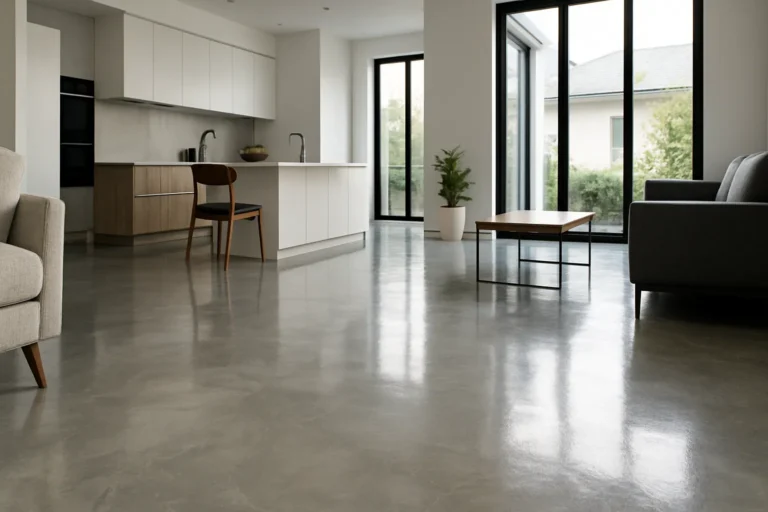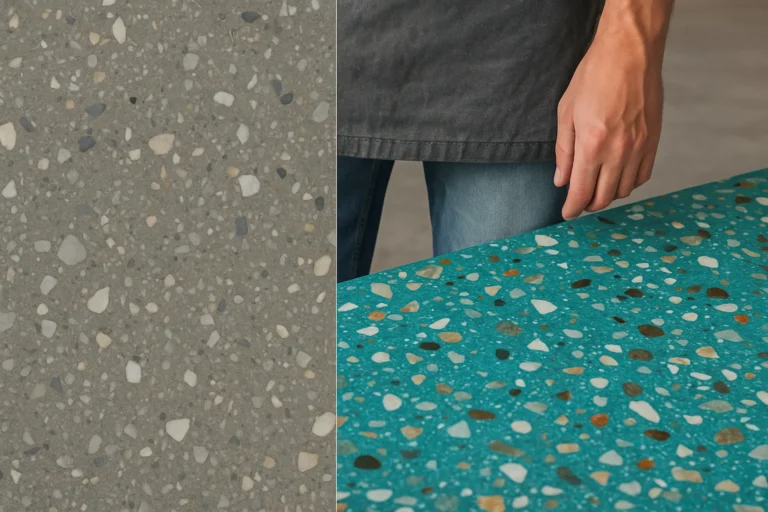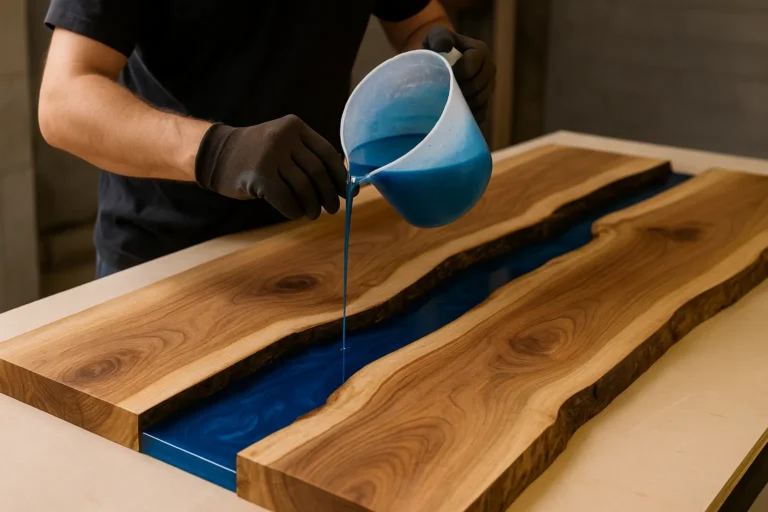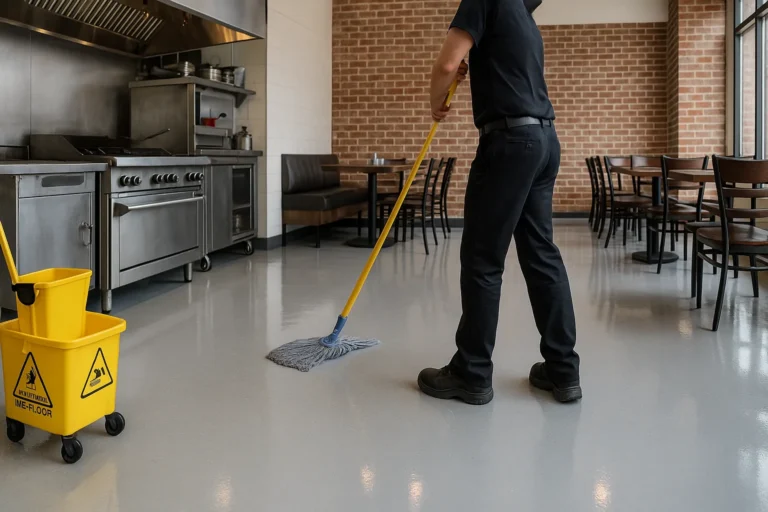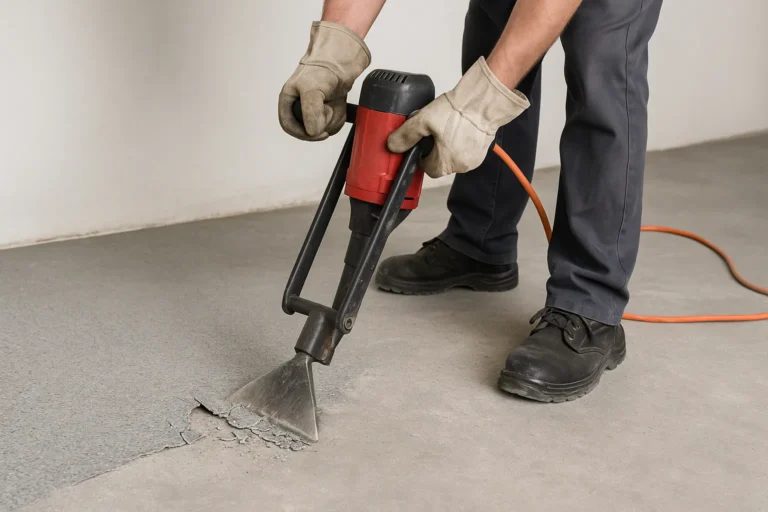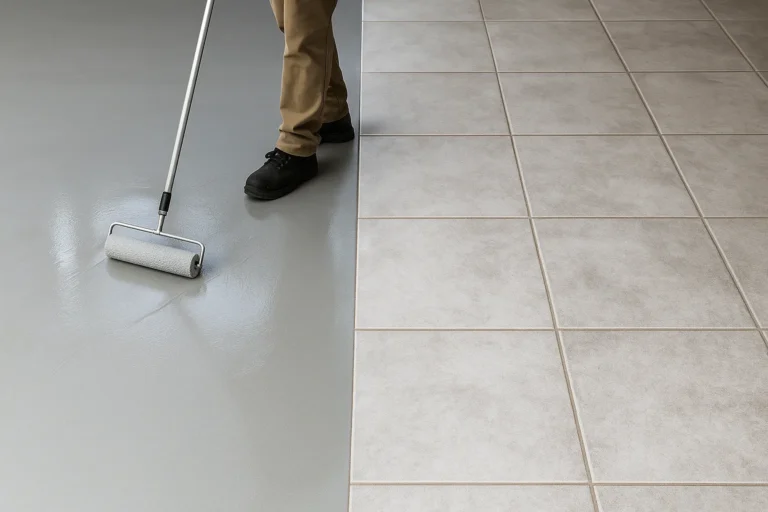Introduction to Microcement Floors
Microcement is a versatile and innovative material composed of cement, water-based resins, additives, and mineral pigments. This unique blend creates a thin, yet highly durable coating that can be applied to various surfaces, including floors, walls, and furniture. The aesthetic appeal of microcement lies in its seamless finish, which provides a sleek and modern look to any space. Its ability to be customized in terms of color and texture makes it a popular choice for contemporary interior design.
- Composition : Cement, water-based resins, additives, mineral pigments
- Aesthetic Appeal : Seamless finish, customizable colors, and textures
The Rising Popularity of Microcement in Modern Architecture
In recent years, microcement has gained significant traction in modern architecture due to its versatility and aesthetic appeal. Architects and interior designers favor microcement for its ability to create continuous surfaces without joints, which enhances the visual flow of spaces. Additionally, its compatibility with various substrates and its eco-friendly properties make it an attractive option for sustainable building practices.
- Popularity Factors : Versatility, aesthetic appeal, eco-friendly properties
- Applications : Floors, walls, furniture, various substrates
The Advantages of Microcement Floors
Seamless and Sleek Design Possibilities
One of the most compelling advantages of microcement floors is their seamless and sleek design. Unlike traditional flooring options that have visible joints and grout lines, microcement provides a continuous surface that enhances the visual flow of any space. This makes it an ideal choice for modern and minimalist interiors.
- Seamless Surface : No visible joints or grout lines
- Design Flexibility : Ideal for modern and minimalist interiors
Durability and Resilience for High Traffic Areas
Microcement floors are known for their durability and resilience, making them suitable for high-traffic areas. The material is resistant to wear and tear, scratches, and impacts, ensuring that the floor maintains its aesthetic appeal over time. This makes it a practical choice for both residential and commercial spaces.
- Durability : Resistant to wear and tear, scratches, and impacts
- High Traffic Suitability : Ideal for residential and commercial spaces
Compatibility with Underfloor Heating Systems
Another significant advantage of microcement floors is their compatibility with underfloor heating systems. The thin layer of microcement allows for efficient heat transfer, ensuring that the floor remains warm and comfortable. This feature is particularly beneficial in colder climates and enhances the overall comfort of the living space.
- Heat Transfer : Efficient heat transfer due to thin layer
- Comfort : Enhances comfort in colder climates
Eco-Friendly Flooring Solutions
Microcement is an eco-friendly flooring solution that aligns with sustainable building practices. The material is composed of natural elements and does not emit harmful VOCs (Volatile Organic Compounds). Additionally, its long lifespan reduces the need for frequent replacements, contributing to environmental conservation.
- Eco-Friendly : Composed of natural elements, no harmful VOCs
- Sustainability : Long lifespan reduces need for replacements
Types of Microcement for Flooring 
Microdeck: The Ideal Choice for Indoor Flooring
Microdeck is a type of microcement specifically designed for indoor flooring. It offers a smooth and durable finish that is perfect for residential and commercial interiors. Its high resistance to foot traffic and easy maintenance make it a popular choice for living rooms, kitchens, and hallways.
- Indoor Use : Designed for residential and commercial interiors
- High Resistance : Suitable for high foot traffic areas
Efectto Quartz: The Ready-to-Use Microcement
Efectto Quartz is a ready-to-use microcement that simplifies the application process. It comes pre-mixed, reducing preparation time and ensuring consistent quality. This type of microcement is ideal for DIY enthusiasts and professionals looking for a quick and efficient flooring solution.
- Ready-to-Use : Pre-mixed for easy application
- Efficiency : Reduces preparation time, ensures consistent quality
Atlantic: Specially Formulated for Pool Surrounds
Atlanttic is a micro cement specifically formulated for pool surrounds and wet areas. Its waterproof properties and slip-resistant finish make it an excellent choice for enhancing the safety and aesthetics of pool decks, bathrooms, and spas.
- Waterproof : Ideal for wet areas like pool surrounds
- Slip-Resistant : Enhances safety in bathrooms and spas
Microstone: The Robust Option for Outdoor Spaces
Microstone is a robust type of microcement designed for outdoor spaces. It offers high resistance to weather conditions, UV rays, and temperature fluctuations. This makes it an ideal choice for patios, terraces, and garden pathways.
- Outdoor Use : Designed for patios, terraces, and garden pathways
- Weather Resistance : High resistance to UV rays and temperature fluctuations
Industrial: Engineered for Industrial Environments
Industtrial microcement is engineered for industrial environments that require high durability and resistance to heavy machinery and chemicals. Its robust composition ensures that it can withstand the rigors of industrial use while maintaining its aesthetic appeal.
- Industrial Use : Suitable for environments with heavy machinery and chemicals
- High Durability : Withstands industrial rigours
Application Process of Microcement Floors
Surface Preparation: Ensuring a Strong Foundation
The first step in the application process of microcement floors is surface preparation. This involves cleaning the substrate, repairing any cracks or imperfections, and ensuring that the surface is level. Proper surface preparation is crucial for achieving a strong and durable microcement floor.
- Cleaning : Remove dirt, dust, and debris
- Repairing : Fix cracks and imperfections
- Leveling : Ensure the surface is even
Priming: The Key to Adhesion
Priming is a critical step that ensures the microcement adheres properly to the substrate. A high-quality primer is applied to create a bonding layer between the substrate and the microcement. This step enhances the durability and longevity of the floor.
- Bonding Layer : Creates a strong bond between substrate and microcement
- Durability : Enhances the longevity of the floor
Base and Finishing Layers: Building Up the Microcement Floor
The application process involves multiple layers, starting with the base layer and followed by the finishing layers. The base layer provides the initial thickness and strength, while the finishing layers add the desired texture and color. Each layer is carefully applied and allowed to dry before the next layer is added.
- Base Layer : Provides initial thickness and strength
- Finishing Layers : Add texture and color
Sealing: The Final Step for Protection and Shine
The final step in the application process is sealing the microcement floor. A high-quality sealer is applied to protect the surface from stains, moisture, and abrasions. The sealer also adds a subtle shine, enhancing the overall appearance of the floor.
- Protection : Guards against stains, moisture, and abrasions
- Aesthetic Enhancement : Adds a subtle shine
Design and Color Options for Microcement Floors
Customizing Colors to Match Interior Design Schemes
One of the standout features of microcement floors is the ability to customize colors to match any interior design scheme. Whether you prefer neutral tones or bold hues, microcement can be tinted to achieve the desired look. This flexibility allows homeowners and designers to create unique and personalized spaces.
- Color Customization : Wide range of color options
- Design Flexibility : Matches any interior design scheme
Textures and Finishes: Personalizing Your Floor
In addition to color customization, microcement floors offer various textures and finishes. From smooth and polished to rough and textured, the options are endless. This allows for further personalization and ensures that the floor complements the overall design aesthetic of the space.
- Texture Options : Smooth, polished, rough, textured
- Personalization : Complements overall design aesthetic
Microcement Floors in Different Settings
Enhancing Kitchens and Bathrooms with Microcement
Microcement floors are an excellent choice for kitchens and bathrooms due to their durability and water-resistant properties. The seamless finish prevents water from seeping through, reducing the risk of mold and mildew. Additionally, the customizable design options allow for a cohesive look that enhances the overall aesthetic of these spaces.
- Water-Resistant : Prevents water seepage, and reduces mold risk
- Cohesive Design : Enhances overall aesthetic
Microcement on Wood: A Harmonious Blend
Applying microcement over wood surfaces creates a harmonious blend of natural and modern elements. This combination is perfect for achieving a rustic yet contemporary look. The microcement layer adds durability and ease of maintenance to the wooden substrate, making it a practical and stylish choice.
- Natural and Modern : Combines rustic and contemporary elements
- Enhanced Durability : Adds durability to wooden substrate
The Versatility of Microcement in Commercial Spaces
Microcement floors are highly versatile and suitable for various commercial spaces, including retail stores, restaurants, and offices. Their durability and easy maintenance make them ideal for high-traffic areas, while the customizable design options allow businesses to create a unique and inviting atmosphere.
- Commercial Use : Suitable for retail stores, restaurants, offices
- High Traffic Durability : Ideal for busy areas
Maintenance and Care for Microcement Floors 
Routine Cleaning Tips for Longevity
Maintaining the beauty and longevity of microcement floors requires routine cleaning. Regular sweeping and mopping with a pH-neutral cleaner will keep the surface free from dirt and grime. Avoid using harsh chemicals or abrasive tools, as they can damage the finish.
- Regular Sweeping : Keeps surface free from dirt
- pH-Neutral Cleaner : Safe for microcement finish
Protecting Your Floor from Stains and Abrasions
To protect your microcement floor from stains and abrasions, use mats or rugs in high-traffic areas and under furniture. Wipe up spills immediately to prevent staining, and use felt pads on the legs of furniture to avoid scratches.
- Use Mats/Rugs : Protects high-traffic areas
- Immediate Spill Cleanup : Prevents staining
- Felt Pads : Avoids scratches from furniture
Periodic Maintenance to Preserve Aesthetics
Periodic maintenance, such as resealing the floor every few years, will help preserve its aesthetics and durability. This process involves applying a new layer of sealer to protect the surface and restore its shine. Consult a professional for the best results. Flooring material aesthetics Minimalist microcement surfaces offer a sleek and modern look for floors and walls They create a smooth and seamless finish that is both stylish and easy to clean
Microcement application experts are skilled professionals who know how to apply thin layers of cement-based material to create smooth and stylish surfaces They can transform floors walls and other surfaces with their specialized techniques and knowledge Microcement cost factors The price of microcement depends on how big the area is and what type you choose Some other things that affect the cost are how much work is needed to prepare the surface and who does the installation
Economical Microcement Solutions offers affordable ways to use thin cement coatings for floors and walls Sleek microcement surfaces are smooth and modern-looking floors or walls They are made from a special cement mixture that creates a seamless and stylish finish
Top microcement manufacturers produce high-quality thin cement coatings for floors and walls These companies specialize in creating durable and stylish microcement products for construction projects Durable museum surfaces are special materials used in museums that can withstand lots of touching and cleaning without getting damaged These surfaces help protect exhibits and make sure they stay in good condition for a long time
Microcement flooring aesthetics Microcement showcases elevate boutique displays by adding a sleek and modern look to store shelves and counters The smooth finish of microcement helps products stand out and creates an upscale feel for shoppers Contemporary kitchen microcement
- Resealing : Apply a new sealer layer every few years
- Professional Consultation : Ensures best results
Cost Considerations for Microcement Flooring
Understanding the Factors Affecting Price
The cost of microcement flooring can vary based on several factors, including the size of the area, the complexity of the design, and the type of microcement used. Additional costs may include surface preparation, labour, and sealing. Understanding these factors will help you budget effectively for your project.
- Area Size : Larger areas may cost more
- Design Complexity : Intricate designs can increase costs
- Microcement Type : Different types have varying prices
Budgeting for Your Microcement Flooring Project
To budget for your microcement flooring project, start by obtaining quotes from multiple contractors. Factor in all potential costs, including materials, labor, and any additional services. Setting aside a contingency fund for unexpected expenses is also advisable.
- Obtain Quotes : Compare multiple contractors
- Factor in All Costs : Materials, labor, additional services
- Contingency Fund : Prepare for unexpected expenses
FAQs on Microcement Floors
What Are the Key Benefits of Choosing Microcement Floors?
Microcement floors offer several key benefits, including a seamless and modern aesthetic, high durability, and easy maintenance. They are also customizable in terms of color and texture, making them a versatile choice for various settings.
How Do Microcement Floors Compare to Polished Concrete?
Microcement floors differ from polished concrete in terms of thickness and application. Microcement is a thin coating applied over existing surfaces, while polished concrete involves grinding and polishing the concrete slab itself. Microcement offers more design flexibility and is easier to install.
Can Microcement Be Applied Over Existing Flooring?
Yes, microcement can be applied over existing flooring, including tiles, wood, and concrete. This makes it a convenient option for renovations, as it eliminates the need for removing the old floor. Proper surface preparation is essential for optimal adhesion.
What Are the Color Options Available for Microcement Floors?
Microcement floors come in a wide range of color options, from neutral tones to vibrant hues. The material can be tinted to match any interior design scheme, providing endless possibilities for customization.
How Should I Maintain My Microcement Floor to Ensure Its Durability?
To maintain the durability of your microcement floor, clean it regularly with a pH-neutral cleaner and avoid using harsh chemicals. Protect the surface from stains and abrasions by using mats, rugs, and felt pads under furniture. Periodic resealing will also help preserve its aesthetics and longevity.
